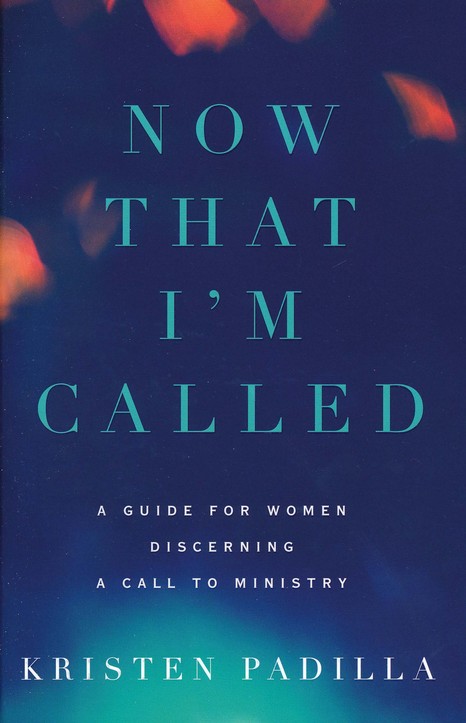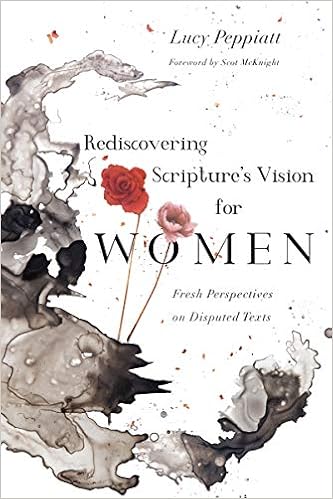 Kristen Padilla, Now That I'm Called: A Guide for Women Discerning a Call to Ministry (Zondervan, 2018)
Kristen Padilla, Now That I'm Called: A Guide for Women Discerning a Call to Ministry (Zondervan, 2018)Kristen writes for women who sense a call to ministry but are not sure how to carry it out in their context. Her book is sensitive to long-standing gender roles and dynamics in complementarian congregations and does not presume that readers are egalitarian. She warmly affirms the giftedness of women and encourages them in their quest to be faithful to God's call.
Alan F. Johnson, ed., How I Changed My Mind about Women in Leadership: Compelling Stories from Prominent Evangelicals (Zondervan, 2010)
 This book is a treasure of stories about men and women who have shifted toward a more egalitarian outlook. A collection of testimonies rather than a systematic argument, this book shows the struggles of Christian leaders to be faithful to Scripture, their "aha!" moments, and the humility it took to admit that they had been wrong.
This book is a treasure of stories about men and women who have shifted toward a more egalitarian outlook. A collection of testimonies rather than a systematic argument, this book shows the struggles of Christian leaders to be faithful to Scripture, their "aha!" moments, and the humility it took to admit that they had been wrong.Carolyn Custis James, Half the Church: Recapturing God's Global Vision for Women (Zondervan)
Carolyn's book urges women to step up and participate in kingdom work. We can't sit back and expect the men to do everything! God created us to work as a team, side-by-side ruling over creation. Carolyn addresses some of the most common arguments for male-only leadership that are rooted in the creation story and in the letters of Paul, showing the problems with those interpretations and inviting readers to consider the urgency of God's design for partnership. This book is one that the entire church, not just women, need to read.
Alice Mathews, Gender Roles and the People of God: Rethinking What We Were Taught about Men and Women in the Church (Zondervan, 2017)
This is an accessible introduction to the key biblical text that so often figure in the debates over women in ministry. Dr. Mathews has been teaching a course at Gordon-Conwell Theological Seminary on this topic for many years, and this book is the best of her classroom content, now available to everyone.
 Lucy Peppiatt, Rediscovering Scripture's Vision for Women: Fresh Perspectives on Disputed Texts (IVP, 2019)
Lucy Peppiatt, Rediscovering Scripture's Vision for Women: Fresh Perspectives on Disputed Texts (IVP, 2019)Lucy's book is a brand new release from InterVarsity Press. As she reexamines the relevant biblical texts, Peppiat "finds a story of God releasing women alongside men into all forms of ministry, leadership, work, and service on the basis of character and gifting, rather than biological sex. Those who see the overturning of male-dominated hierarchy in the Scriptures, she argues, are truly rediscovering an ancient message―a message distorted by those who assumed that a patriarchal world, which they sometimes saw reflected in the Bible, was the one God had ordained." (from publisher's book description)
Craig S. Keener, Paul, Women, and Wives: Marriage and Women's Ministry in the Letters of Paul (Baker, 1992)
Dr. Keener's book landed on my desk on an interesting day. An invitation to preach had just been retracted on account of my gender (the pastor got complaints when people found out I was coming). Dr. Keener examines the cultural and historical context that motivated Paul's statements, offering a new perspective on how to read them responsibly.
 Cynthia Long Westfall, Paul and Gender: Reclaiming the Apostle's Vision for Men and Women in Christ (Baker, 2016)
Cynthia Long Westfall, Paul and Gender: Reclaiming the Apostle's Vision for Men and Women in Christ (Baker, 2016)Dr. Westfall explores the broader question of gender according to Paul, revisiting the most controversial texts to offer a fresh perspective. She is historically grounded and moves the debate forward in helpful ways based on the latest research.
You'll notice that the subtitles of several of these books share a similar tone: recapturing, rediscovering, rethinking, reclaiming. These authors all agree that something is missing in Evangelical churches today. In our efforts to obey the Bible, our churches have implemented practices that inadvertently prevent gospel ministry and silence the Spirit's work. These authors -- all of them Evangelicals -- call us back to the Scriptures to take another look. Things are not as simple as many have assumed ("women, be silent"), and our faithful reading and practice of Scripture depends upon a careful reassessment. If Scripture is to remain our authority for faith and practice, we cannot afford to get this wrong.





